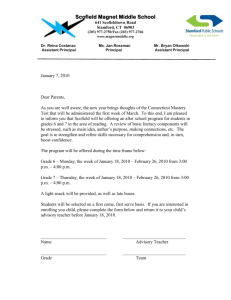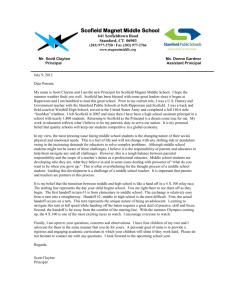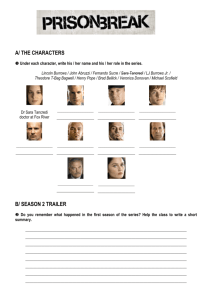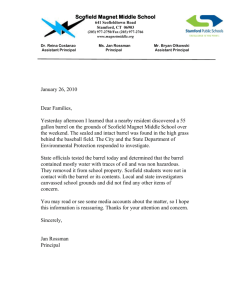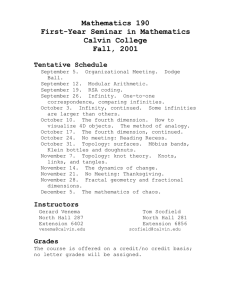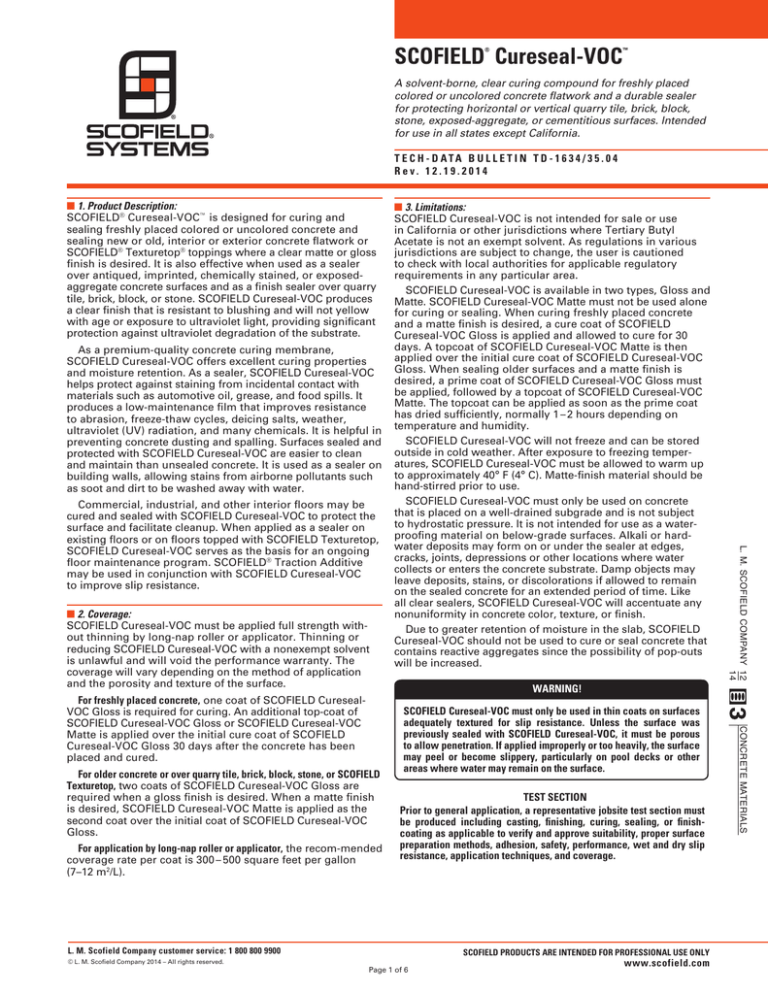
SCOFIELD Cureseal-VOC
®
™
A solvent-borne, clear curing compound for freshly placed
colored or uncolored concrete flatwork and a durable sealer
for protecting horizontal or vertical quarry tile, brick, block,
stone, exposed-aggregate, or cementitious surfaces. Intended
for use in all states except California.
T E C H - D ATA B U L L E T I N T D - 1 6 3 4 / 3 5 . 0 4
Rev. 12.19.2014
■ 1. Product Description:
SCOFIELD® Cureseal-VOC™ is designed for curing and
sealing freshly placed colored or uncolored concrete and
sealing new or old, interior or exterior concrete flatwork or
SCOFIELD® Texturetop® toppings where a clear matte or gloss
finish is desired. It is also effective when used as a sealer
over antiqued, imprinted, chemically stained, or exposedaggregate concrete surfaces and as a finish sealer over quarry
tile, brick, block, or stone. SCOFIELD Cureseal-VOC produces
a clear finish that is resistant to blushing and will not yellow
with age or exposure to ultraviolet light, providing significant
protection against ultraviolet degradation of the substrate.
As a premium-quality concrete curing membrane,
SCOFIELD Cureseal-VOC offers excellent curing properties
and moisture retention. As a sealer, SCOFIELD Cureseal-VOC
helps protect against staining from incidental contact with
materials such as automotive oil, grease, and food spills. It
produces a low-maintenance film that improves resistance
to abrasion, freeze-thaw cycles, deicing salts, weather,
ultraviolet (UV) radiation, and many chemicals. It is helpful in
preventing concrete dusting and spalling. Surfaces sealed and
protected with SCOFIELD Cureseal-VOC are easier to clean
and maintain than unsealed concrete. It is used as a sealer on
building walls, allowing stains from airborne pollutants such
as soot and dirt to be washed away with water.
■ 2. Coverage:
SCOFIELD Cureseal-VOC must be applied full strength without thinning by long-nap roller or applicator. Thinning or
reducing SCOFIELD Cureseal-VOC with a nonexempt solvent
is unlawful and will void the performance warranty. The
coverage will vary depending on the method of application
and the porosity and texture of the surface.
For older concrete or over quarry tile, brick, block, stone, or SCOFIELD
Texturetop, two coats of SCOFIELD Cureseal‑VOC Gloss are
required when a gloss finish is desired. When a matte finish
is desired, SCOFIELD Cureseal-VOC Matte is applied as the
second coat over the initial coat of SCOFIELD Cureseal-VOC
Gloss.
For application by long-nap roller or applicator, the recom-mended
coverage rate per coat is 300 – 500 square feet per gallon
(7–12 m2/L).
WARNING!
SCOFIELD Cureseal-VOC must only be used in thin coats on surfaces
adequately textured for slip resistance. Unless the surface was
previously sealed with SCOFIELD Cureseal‑VOC, it must be porous
to allow penetration. If applied improp­erly or too heavily, the surface
may peel or become slippery, particularly on pool decks or other
areas where water may remain on the surface.
TEST SECTION
Prior to general application, a representative jobsite test section must
be produced including casting, finishing, curing, sealing, or finishcoating as applicable to verify and approve suitability, proper surface
preparation methods, adhesion, safety, performance, wet and dry slip
resistance, application techniques, and coverage.
L. M. Scofield Company customer service: 1 800 800 9900
© L. M. Scofield Company 2014 – All rights reserved.
SCOFIELD PRODUCTS ARE INTENDED FOR PROFESSIONAL USE ONLY
Page 1 of 6
www.scofield.com
CONCRETE MATERIALS
For freshly placed concrete, one coat of SCOFIELD CuresealVOC Gloss is required for curing. An additional top-coat of
SCOFIELD Cureseal-VOC Gloss or SCOFIELD Cureseal‑VOC
Matte is applied over the initial cure coat of SCOFIELD
Cureseal-VOC Gloss 30 days after the concrete has been
placed and cured.
L. M. SCOFIELD COMPANY 12
14
Commercial, industrial, and other interior floors may be
cured and sealed with SCOFIELD Cureseal-VOC to protect the
surface and facilitate cleanup. When applied as a sealer on
existing floors or on floors topped with SCOFIELD Texturetop,
SCOFIELD Cureseal-VOC serves as the basis for an ongoing
floor maintenance program. SCOFIELD® Traction Additive
may be used in conjunction with SCOFIELD Cureseal-VOC
to improve slip resistance.
■ 3. Limitations:
SCOFIELD Cureseal-VOC is not intended for sale or use
in California or other jurisdictions where Tertiary Butyl
Acetate is not an exempt solvent. As regulations in various
jurisdictions are subject to change, the user is cautioned
to check with local authorities for applicable regulatory
requirements in any particular area.
SCOFIELD Cureseal-VOC is available in two types, Gloss and
Matte. SCOFIELD Cureseal-VOC Matte must not be used alone
for curing or sealing. When curing freshly placed concrete
and a matte finish is desired, a cure coat of SCOFIELD
Cureseal‑VOC Gloss is applied and allowed to cure for 30
days. A topcoat of SCOFIELD Cureseal-VOC Matte is then
applied over the initial cure coat of SCOFIELD Cureseal‑VOC
Gloss. When sealing older surfaces and a matte finish is
desired, a prime coat of SCOFIELD Cureseal-VOC Gloss must
be applied, followed by a topcoat of SCOFIELD Cureseal-VOC
Matte. The topcoat can be applied as soon as the prime coat
has dried sufficiently, normally 1 – 2 hours depending on
temperature and humidity.
SCOFIELD Cureseal-VOC will not freeze and can be stored
outside in cold weather. After exposure to freezing temperatures, SCOFIELD Cureseal-VOC must be allowed to warm up
to approximately 40° F (4° C). Matte-finish material should be
hand-stirred prior to use.
SCOFIELD Cureseal-VOC must only be used on concrete
that is placed on a well-drained subgrade and is not subject
to hydrostatic pressure. It is not intended for use as a waterproofing material on below-grade surfaces. Alkali or hardwater deposits may form on or under the sealer at edges,
cracks, joints, depressions or other locations where water
collects or enters the concrete substrate. Damp objects may
leave deposits, stains, or discolorations if allowed to remain
on the sealed concrete for an extended period of time. Like
all clear sealers, SCOFIELD Cureseal-VOC will accentuate any
nonuniformity in concrete color, texture, or finish.
Due to greater retention of moisture in the slab, SCOFIELD
Cureseal-VOC should not be used to cure or seal concrete that
contains reactive aggregates since the possibility of pop-outs
will be increased.
SCOFIELD® Cureseal-VOC™ TD-1634/35.04
Refer to www.scofield.com for the most recent Scofield Tech-Data Bulletins
SCOFIELD Cureseal-VOC should not be used in areas
subject to water submersion or continuous chemical
exposure, concentrated abrasion and scratching, or metalwheeled traffic. On areas subject to forklift traffic, the use of
nonmarking tires is recommended to avoid unsightly black tire
marks.
resistance. After the test application of SCOFIELD CuresealVOC has fully cured, a minimum of 14 days, the chemical in
question should be applied and left on the surface for the
maximum possible time it would remain under the expected
conditions of service.
Most paints and adhesives for floor coverings are
compatible when applied over SCOFIELD Cureseal-VOC, but
testing is required with the particular materials in question to
verify compatibility before their application.
■ 9. Textures and Slip Resistance:
Surfaces that are not slip resistant to meet the intended use
must be roughened by some mechanical method. Adequate
precautions must be taken to ensure that the surface is not
slippery. SCOFIELD Traction Additive will help improve slip
resistance when used according to directions.
SCOFIELD Cureseal-VOC must be applied when concrete
and air temperatures are between 40 and 80° F (4 – 27° C).
At temperatures above 70° F (21° C) the surface must
be divided into small work sections to help maintain a
wet edge, as SCOFIELD Cureseal-VOC will dry quickly
under these conditions. Application must not be made on
surfaces previously treated with a water or stain repellent.
For safety considerations, a representative jobsite test
section must be prepared and sealed prior to general
application and the entire surface inspected after completion to verify and approve the adequacy of wet and dry
slip resistance.
SCOFIELD Cureseal-VOC is a premium-quality curing and
sealing formulation and, like all such products, will require
periodic maintenance and reapplication. Spills should be
removed promptly and floors cleaned regularly to minimize
possible staining and damage to the sealer.
■ 10. Cautions:
DANGER!
EXTREMELY FLAMMABLE LIQUID AND VAPOR. VAPORS HARMFUL.
VAPORS MAY CAUSE FLASH FIRE. HARMFUL OR FATAL IF
SWALLOWED. KEEP OUT OF THE REACH OF CHILDREN. CONTAINS
PETROLEUM DISTILLATES. MAY AFFECT THE BRAIN OR CENTRAL
NERVOUS SYSTEM CAUSING DIZZINESS, HEADACHE, OR NAUSEA.
CAUSES EYE, SKIN, NOSE, AND THROAT IRRITATION. MAY CAUSE
ALLERGIC SKIN REACTION. DO NOT TAKE INTERNALLY.
■ 4. Composition and Materials:
SCOFIELD Cureseal-VOC is a blend of 100% methacrylate
polymers and UV inhibitors in a fast drying aromatic solvent.
No fillers are used and no oils, waxes, or saponifiable resins
are contained in the mixture.
■ 5. Applicable Standards:
SCOFIELD Cureseal-VOC Gloss and SCOFIELD Cureseal-VOC
Matte comply with the following specifications: ASTM C 1315,
Type 1, Class A, B, and C; ASTM C 309, Type 1, Class A and
B; AASHTO Des. M-148; DE CRD–C-300; Federal Specification
TT-C-0800; and Federal EPA and Ozone Transport Commission
VOC requirements.
NOTICE: Reports have associated repeated and prolonged
occupational overexposure to solvents with permanent
brain and nervous system damage. Intentional misuse by
deliberately concentrating and inhaling the contents may
be harmful or fatal. See MSDS for further information.
A.I.M. Definition: SCOFIELD Cureseal-VOC is a liquid membrane-forming compound marketed and sold solely for application to concrete surfaces to reduce the loss of water during
the hardening process and to seal old and new concrete,
providing resistance against alkalis, acids, and ultraviolet
light, and provide adhesion promotion qualities. SCOFIELD
Cureseal-VOC meets the requirements of the American
Society for Testing and Materials (ASTM) Designation C 1315
Standard Specification for Liquid Membrane-Forming
Compounds Having Special Properties for Curing and Sealing
Concrete.
Keep away from heat, sparks, and flame. Do not smoke.
Extinguish all flames and pilot lights, and turn off stoves,
heaters, electric motors and other sources of ignition
during use and until all vapors are gone. Prevent buildup
of vapors by opening all windows and doors to achieve
cross-ventilation. Use only with adequate ventilation.
Do not breathe vapors or spray mists. Ensure fresh air
entry during application and drying. If you experience
eye watering, headache or dizziness or if air monitoring
demonstrates vapor/mist levels are above applicable
limits, wear an appropriate, properly fitted respirator
(NIOSH approved) during and after application. Follow
respirator manufacturer’s directions for respirator
use. Avoid contact with eyes, skin and clothing. Wash
thoroughly after handling.
■ 6. Packaging:
SCOFIELD Cureseal-VOC is available from stock in 1-gallon
(3.8 L) and 5-gallon (18.9 L) pails and by special order in
55‑gallon (208 L) drums.
INTERIOR USE
WARNING: Do not allow vapors from this product to
penetrate into foodstuffs. Remove animals from quarters
until all vapors have dissipated. SCOFIELD Cureseal-VOC is
nontoxic in its cured state.
A.I.M. Category: Curing and Sealing Compound, maximum
VOC 350 g/L (2.92 lb/gal).
■ 7. Storage and Shelf Life:
When stored in the original unopened containers and
protected from extreme heat, the shelf life of SCOFIELD
Cureseal‑VOC is at least 2 years from the date of
manufacture. Inventory must be rotated to maintain product
that is within shelf life limits.
■ 8. Chemical Resistance and Staining:
Chemical resistance may vary depending on the condition
of the concrete substrate, curing techniques, surface
preparation, method of application, the length of time the
chemical remains on the surface, and other factors. When
chemical protection is required or resistance to staining is
important, a representative test application must be made on
the jobsite substrate to determine if the sealer has suitable
First Aid: Eyes — In case of eye contact, flush immediately
with large amounts of water for at least 15 minutes and get
medical attention immediately. Ingestion — If swallowed, do
not induce vomiting. Give conscious victim 1 to 2 glasses of
water and get medical attention immediately. Skin — Wash
thoroughly with soap and water. Inhalation — If you experience difficulty in breathing, leave the area to obtain fresh
air. If continued difficulty is experienced, get medical attention immediately. If symptoms persist or develop, get
medical attention.
In Case of Fire: Use CO2 or dry chemical extinguisher. Do
not use water spray.
L. M. Scofield Company customer service: 1 800 800 9900
SCOFIELD PRODUCTS ARE INTENDED FOR PROFESSIONAL USE ONLY
© L. M. Scofield Company 2014 – All rights reserved.
Page 2 of 6
www.scofield.com
SCOFIELD® Cureseal-VOC™ TD-1634/35.04
Refer to www.scofield.com for the most recent Scofield Tech-Data Bulletins
Keep container closed when not in use. If spilled, eliminate
all sources of ignition. Contain spilled material and remove
with inert absorbent using non-sparking tools. Dispose of
contaminated absorbent, container, and unused contents in
accordance with all applicable regulations. After container
has been emptied it may contain explosive and harmful
vapors and residue. Keep away from heat, sparks, and flame.
Do not cut, puncture, or weld on or near container. Do not
reuse empty container. Before using or handling, read the
Material Safety Data Sheet and Warranty.
■ 11. Equipment for Preparation and Application:
When using equipment and materials during preparation
and installation, suitable protective gear must be worn and
government regulations, manufacturer’s instructions, and
all applicable safety requirements must be followed.
Immediately prior to applying the seal coat, the concrete
must be thoroughly cleaned by sweeping or vacuuming.
Significantly stained, mottled, or damaged sections should be
stripped. Mottled areas may also require acid washing after
stripping to remove alkali deposits. These may form under the
cure coat when application is made to concrete that contained
excessive water when placed or where there was an unusual
subsurface moisture condition. Additional preparation methods are described below and in section 15. Maintenance and
Removal. The surface must be rinsed after cleaning until
the rinse water is completely clean. After drying, the surface
should be inspected closely, and additional general or spot
cleaning and rinsing should be performed if necessary.
After the surface is completely dry, wear paths, scratches,
scrapes, and other areas where the cure coat has been
removed by wear or cleaning should be spot-sealed using
a fine-bristle brush to apply and feather the sealer into the
surrounding unmarred surface. All spot-sealed or resealed
sections should be allowed to dry thoroughly before application of the seal coat.
Use of a pressure washer, a rotary floor machine, or a
walk-behind scrubbing machine will facilitate surface preparation on cured concrete, quarry tile, brick, block, or stone
floors. A long-nap roller or applicator is required for applying SCOFIELD Cureseal-VOC.
WARNING!
Any electrical equipment used with SCOFIELD Cureseal‑VOC must
be explosion proof or otherwise designed specifically for use with
solvent-based products. Care must be taken to prevent sparks at
electrical outlets or wherever solvent vapors may be present.
For preparation, the pressure washer must be equipped with a
fan tip and have a minimum pressure capability of 2000 psi
(14 MPa). Hot water capability may facilitate cleaning of older
concrete. Nonmarking hoses are helpful.
For preparation, the rotary floor machine must be heavy duty
and operate at approximately 175 rpm. It may be equipped
with brushes or with a pad driver that securely holds pads in
place. A stiff-bristled bassine or nylon scrub brush is recommended. On flat interior floors, blue scrubbing or black
stripping pads may be required. Walk-behind scrubbing
machines should be considered for cleaning larger areas.
For application by roller, the roller must be long-napped with
a recommended pile depth of 1 1/4 inch (32 mm), of professional quality, and a suitable size. An adequate supply
of refill rollers should be available so they may be changed
whenever necessary.
For application, the long-nap applicator must be of professional
quality, of a suitable size, and in good condition to ensure
even coverage.
■ 12. Preparation for Sealing:
During cleaning and stripping procedures, all surrounding
areas should be closed to traffic, roped off, and protected.
Testing should be performed to verify that the cleaning or
stripping methods and materials will not damage the concrete.
To reduce hard-water and alkali deposits, sprinklers and
fountains should be adjusted to avoid wetting of the surface.
In hard-water areas, soft water should be considered for use
in water features. Construction joints should be sealed with a
high-quality joint sealant.
All washed or wet areas must be allowed to dry thoroughly
before application of SCOFIELD Cureseal-VOC or moisture may
be trapped under the sealer, causing a white haze to develop.
Newly placed concrete cured with SCOFIELD Cureseal-VOC
Gloss should receive an additional seal coat of SCOFIELD
Cureseal-VOC Gloss when a gloss finish is desired. When
a matte finish is desired, SCOFIELD Cureseal-VOC Matte is
applied as the seal coat over the initial cure coat of SCOFIELD
Cureseal‑VOC Gloss. The seal coat should be applied 30 days
after the concrete has been placed and cured.
Older concrete surfaces or quarry tile, brick, block, or stone must
have a uniformly slip-resistant surface. Surfaces that are not
slip resistant must be roughened by some mechanical method.
Concrete previously sealed with SCOFIELD Cure-seal-VOC
should be prepared as described in section 15. Maintenance
and Removal.
Before sealing concrete surfaces that have not been
previously sealed with SCOFIELD Cureseal-VOC, all dirt, oil,
grease, previously applied curing compounds, sealers, and
coatings must be completely removed. Failure to remove
all contaminants and coatings that impede the penetration
of SCOFIELD Cureseal-VOC into the concrete will cause
appearance defects, adhesion loss or peeling, and reduced
durability.
Concrete not previously cured or sealed with SCOFIELD
Cureseal-VOC must be cleaned completely so that the surface
is penetrable. An indication of whether the concrete is
penetrable can be obtained by spotting the surface with water.
The water should immediately darken the substrate and be
readily absorbed. If the water beads and does not penetrate or
only penetrates in some areas, additional surface preparation
and testing must be performed.
The cleaning method to be used depends on the surface
finish and the condition of the concrete. Detergents, paint
removers, or other commercial cleaners should be considered
and tested. Pressure washing or scrubbing with a rotary floor
machine is normally required. Any dirt or other material
remaining will show through the clear sealer.
After cleaning, the surface must be rinsed to remove any
remaining residue. Rinsing should continue until the rinse
water is completely clean. Wet vacuums may be helpful to
remove dirty water, particularly from interior floors. After
drying, the surface must be carefully inspected and retested
for penetrability. Additional general or spot cleaning and
rinsing should be performed if necessary. All washed or wet
areas must be allowed to dry completely before application
of SCOFIELD Cureseal-VOC.
Particular care must be taken to completely remove any
release agent that may have been applied. The presence
of most release agents will adversely affect the physical
properties of SCOFIELD Cureseal-VOC and cause adhesion
loss between the sealer and the concrete.
Exterior flatwork or interior floors topped with SCOFIELD Texturetop
must be sufficiently cured to walk on without damage prior
to sealing, at least 16 – 24 hours after installa-tion at 70° F (21°
C) and 50% relative humidity. Dust, slurry residue, or other
contaminants must be removed from the Texturetop surface
by light pressure washing. All washed or wet areas must be
allowed to dry completely before SCO- FIELD Cureseal-VOC
is applied. Do not use aggressive removal methods before
the topping has adequately hardened, a minimum of 14 days
after installation.
L. M. Scofield Company customer service: 1 800 800 9900
SCOFIELD PRODUCTS ARE INTENDED FOR PROFESSIONAL USE ONLY
© L. M. Scofield Company 2014 – All rights reserved.
Page 3 of 6
www.scofield.com
SCOFIELD® Cureseal-VOC™ TD-1634/35.04
Refer to www.scofield.com for the most recent Scofield Tech-Data Bulletins
■ 13. Application as a Curing Membrane and Sealer:
Surrounding areas, landscaping, and adjacent surfaces must
be masked or protected from spills, tracking, and equipment
contact. The work area should be roped off, nearby vehicles
removed, and appropriate sections closed to traffic. All open
flames, pilot lights, sparking equipment, or any other source
of ignition must be extinguished or removed. The surface
should be divided into work sections using walls, joint lines,
or other stationary features as natural stopping points. This
allows for easier control of coverage, wet edge, and overlap.
The concrete must be uniformly and adequately textured
for slip resistance. Application must be made at the coverage
rate recommended in section 2. Coverage using the equipment described in section 11. Equipment for Preparation
and Application.
SCOFIELD Cureseal-VOC Gloss requires no mixing or
dilution and must be applied full strength (unthinned). Prior to
use, SCOFIELD Cureseal-VOC Matte must be hand-stirred
until a uniform consistency has been reached, then applied
full strength (unthinned).
The curing membrane must be applied uniformly as soon
as the surface of the concrete has sufficiently set so it can
be walked on gently without marring, the surface moisture
has evaporated, and no condensation or sweating can occur.
During application, all surfaces must be in approximately the
same state of hardening.
During cold, foggy, or damp weather or periods of significantly falling temperatures, the concrete may sweat or
condensation may form on the surface, thereby preventing
the curing membrane from drying and adhering properly.
Application of the membrane should be made after condensation ceases, and when temperatures will not fall below
40° F (4° C). When interior heat is required, air heaters that
do not have open flames or other sources of ignition and that
vent exhaust flue gases to the outside should be used to avoid
concrete carbonation resulting from carbon dioxide buildup.
Salamanders should not be used. Temperatures and humidity
should be moderate and consistently maintained.
After application is finished, tools should be cleaned with
an aromatic solvent following the solvent manufacturer’s
instructions and safety requirements. The curing surfaces
should not be walked on for at least 2 hours after application.
Freshly placed concrete should not be covered with plastic
sheets or waterproof paper. If additional protection is
absolutely required, the curing surfaces should remain
uncovered for a minimum of 4 days, after which time new
and unwrinkled, nonstaining, reinforced kraft curing paper
which conforms to ASTM C 171 Sheet Materials for Curing
Concrete may be used. The use of plastic sheeting for
protection is never recommended. When protection from
plastering is required, the kraft paper should be removed
at the end of each day, the concrete cleaned of all plaster
and plaster-water residue, and the paper reinstalled the
next morning if necessary.
In most applications the use of one coat of SCOFIELD
Cureseal-VOC Gloss as a curing membrane is satisfactory.
An additional application of SCOFIELD Cureseal-VOC Gloss
is applied 30 days after the concrete has been placed and
cured when a gloss finish is desired. When a matte finish is
desired, use SCOFIELD Cureseal-VOC Matte for the additional
seal coat. For a more even application, the seal coat should
be applied at 90 degrees to the direction of the cure coat.
■ 14. Application as a Sealer:
If an older concrete slab is to be protected with SCOFIELD
Cureseal-VOC or an additional seal coat is to be applied to
newly placed concrete cured with SCOFIELD Cureseal-VOC,
all surfaces must be properly prepared as described in section
12. Preparation for Sealing.
One coat of SCOFIELD Cureseal-VOC Gloss, back-rolled,
is usually sufficient on new concrete previously cured with
SCOFIELD Cureseal-VOC Gloss. Use SCOFIELD Cureseal-VOC
Matte as the seal coat when a matte finish is desired. Two
coats of SCOFIELD Cureseal-VOC Gloss should be used for
sealing older cured concrete, quarry tile, brick, block, stone,
exposed-aggregate, or SCOFIELD Texturetop surfaces when
a gloss finish is desired. When a matte finish is desired, a
prime coat of SCOFIELD Cureseal-VOC Gloss must be applied,
followed by a topcoat of SCOFIELD Cureseal‑VOC Matte. The
topcoat can be applied as soon as the prime coat has dried
sufficiently, normally 1– 2 hours depending on temperature
and humidity.
Surrounding areas, landscaping, and adjacent surfaces must
be masked or protected from spills, tracking, and equipment
contact. The work area should be roped off, nearby vehicles
removed, and appropriate sections closed to traffic. All open
flames, pilot lights, sparking equipment, or any other source
of ignition must be extinguished or removed. The surface
should be divided into work sections using walls, joint lines,
or other stationary features as natural stopping points. This
allows for easier control of coverage, wet edge, and overlap.
All washed or wet areas should must be allowed to dry
thoroughly before the application of SCOFIELD Cureseal-VOC
or moisture may be trapped under the sealer, causing a white
haze to develop. Applying an additional coat of SCOFIELD
Cureseal-VOC over the whitened areas will dissolve the
sealer, allowing the moisture to escape. The sealer will then
reharden clear.
SCOFIELD Cureseal-VOC Gloss requires no mixing or
dilution and must be applied full strength (unthinned). Prior
to use, SCOFIELD Cureseal-VOC Matte must be hand-stirred
until a uniform consistency has been reached, then applied
full strength (unthinned). Application must be made at the
coverage rate recommended in section 2. Coverage using
the equipment described in section 11. Equipment for
Preparation and Application.
The sealer must be spread as thinly and evenly as possible
using a long-napped roller or applicator. Curbs, risers, or walls
are easily roller coated. A wet edge should be maintained,
and overlap controlled. SCOFIELD Cureseal‑VOC should
not be overapplied or allowed to puddle or collect in joint
indentations. A brush or rag should be kept available to brush
out or mop up excess material.
The sealer should be applied on a calm day when concrete
and air temperatures are between 50 and 80° F (10 – 27° C) and
will not fall below 40° F (4° C). At temperatures high in the
established range, the sealer will dry quickly, and the surface
should be divided into small work sections to help maintain a
wet edge. The surface must be dry and not subject to moisture
that may interfere with the sealer drying properly. Application should not be made during rainy, foggy, or very humid
weather when water condensation forms on the surface. On
hot, dry days, application should be made during the cooler
part of the day and when the concrete is in the shade.
The second seal coat may be applied after the first coat has
dried sufficiently, normally 1 – 2 hours after application of the
first coat depending on temperature and humidity. If a matte
finish is desired, SCOFIELD Cureseal-VOC Matte must be
applied as the second coat over the initial coat of SCOFIELD
Cureseal‑VOC Gloss. For a more even application, the second
coat should be applied at 90 degrees to the direction of the
first coat.
After application is finished, tools should be cleaned with
an aromatic solvent following the solvent manufacturer’s
instructions and safety requirements. SCOFIELD Cureseal‑VOC
must be allowed to dry completely, normally 8 – 24 hours,
before it is subjected to temperatures below 40° F (4° C)
or to water from any source, such as hoses, sprinklers,
condensation, or rain.
L. M. Scofield Company customer service: 1 800 800 9900
SCOFIELD PRODUCTS ARE INTENDED FOR PROFESSIONAL USE ONLY
© L. M. Scofield Company 2014 – All rights reserved.
Page 4 of 6
www.scofield.com
SCOFIELD® Cureseal-VOC™ TD-1634/35.04
Refer to www.scofield.com for the most recent Scofield Tech-Data Bulletins
Sealed surfaces will be tack-free after approximately 1 hour
at a temperature of 70° F (21° C) and 50% relative humidity.
Under these conditions, the area may be walked on gently
after a minimum of 2 hours.
After the sealer is completely dry, the area may be
opened to light use after a minimum of 8 hours and to
general use after a minimum of 24 hours. Longer drying
times are helpful and will be necessary if temperatures
are lower or the humidity is higher. The full performance
capabilities of SCOFIELD Cureseal-VOC develop within
approximately 24 hours after application at 70° F (21° C)
and 50% relative humidity.
To avoid staining, the sealed surfaces should be protected
from damage by other trades until they are fully cured. Heavy
objects dropped or dragged will abrade the surface of
the sealer.
All sealed surfaces should be thoroughly inspected to verify
and approve installation and safety, including wet and dry slip
resistance, before the area is opened to traffic.
■ 15. Maintenance and Removal:
All maintenance and removal methods should be tested, and
all surrounding areas should be closed to traffic, roped off,
and protected.
For maintenance, sealed interior surfaces should be topcoated with a sacrificial floor finish to protect and maintain
the original appearance and extend the period between
reapplications of SCOFIELD Cureseal-VOC. After the final
SCOFIELD Cureseal-VOC application has been allowed to dry
a minimum of 72 hours, a compatible, slip-resistant, emulsiontype, commercial floor finish should be used following the
manufacturer’s instructions and safety requirements.
A maintenance application of SCOFIELD Cureseal-VOC
should be made periodically as the sealer is worn off the
surface. The need for maintenance applications will be
accelerated in areas of heavy use or that receive frequent or
aggressive cleaning. It is not necessary to strip the previously
applied SCOFIELD Cureseal-VOC unless film buildup is heavy
or the surface cannot be cleaned sufficiently. Previously
applied floor finish should be completely removed following
the manufacturer’s instructions and safety requirements. All
dirt and contaminants must be completely removed from
the surface of the sealer, and the surface thoroughly rinsed
and allowed to dry. Wear paths, scratches, scrapes, and
other areas where the sealer has been removed by wear or
cleaning should be spot-sealed with SCOFIELD Cureseal-VOC
using a fine-bristle brush to apply and feather the sealer into
the surrounding surface. After the spot-sealed areas are
completely dry, SCOFIELD Cureseal-VOC may be reapplied
and slip resistance verified following the instructions in
section 14. Application as a Sealer. Care must be taken so
that excessive buildup of the sealer does not occur, thereby
reducing durability and slip resistance.
When complete removal of SCOFIELD Cureseal-VOC is
necessary, commercial coating removers or strippers should
be tested and evaluated for safety and effectiveness following
the manufacturer’s instructions and safety requirements.
■ 16. Availability:
SCOFIELD Cureseal-VOC is marketed nationwide and
internationally, directly to the user through strategically
located warehouses, dealers, and representatives. Contact
Scofield
for its nearest representative.
Scofield offers a complete line of engineered systems
for coloring, texturing, and improving performance in
architectural concrete. Scofield Systems address specialized
requirements for interior, exterior and vertical uses with
compatible systems of complementary products including
coloring admixtures, color hardeners, colored cementitious
toppings, stains, curing compounds, sealers, coatings, repair
products and texturing tools. Visit the Scofield website at
www.scofield.com for further information.
■ 17. Limited Warranty:
Since no control is exercised over product use, L. M. Scofield
Company (Scofield) represents and warrants only that its
products are of consistent quality within manufacturing tolerances. NO OTHER ORAL OR WRITTEN REPRESENTATION
OR STATEMENT OF ANY KIND, EXPRESS OR IMPLIED, NOW
OR HEREAFTER MADE IS AUTHORIZED OR WARRANTED BY
SCOFIELD, INCLUDING THOSE OF MERCHANTABILITY OR
FITNESS FOR A PARTICULAR PURPOSE. Liability for breach
of contract, negligence, or on any other legal basis is limited
to the lesser of refund or replacement of defective materials.
SCOFIELD WILL NOT BE LIABLE FOR SPECIAL, INCIDENTAL
OR CONSEQUENTIAL DAMAGES, INCLUDING FOR DELAYS
OR LOST PROFITS. Communication of this warranty and its
limitations to end users is not the responsibility of Scofield,
but should be communicated by those in direct contract with
the end user. Any claim regarding product defect must be
received in writing within one year from the date of manufacture. No claim will be considered without such written
notice or after the specified time interval. The end user shall
determine the suitability of the products for the intended use
and assumes all risks and liability in connection therewith.
See page 6 for Suggested Short Form Specifications.
L. M. Scofield Company customer service: 1 800 800 9900
© L. M. Scofield Company 2014 – All rights reserved.
SCOFIELD PRODUCTS ARE INTENDED FOR PROFESSIONAL USE ONLY
Page 5 of 6
www.scofield.com
SCOFIELD® Cureseal-VOC™ TD-1634/35.04
Refer to www.scofield.com for the most recent Scofield Tech-Data Bulletins
Suggested Short Form Specification for Curing and Sealing Concrete Flatwork
All concrete flatwork designated as being cured and sealed in the plans and specifications shall be cured and
sealed with SCOFIELD® Cureseal-VOC™ Gloss (optional: and top-coated with SCOFIELD® Cureseal-VOC™ Matte)
manufactured by L. M. Scofield Company, (800) 800-9900, Los Angeles, CA, (323) 720-3000, and Atlanta, GA,
(770) 920-6000. SCOFIELD® Cureseal-VOC™ Gloss (optional: and SCOFIELD® Cureseal-VOC™ Matte) shall be
applied full strength in accordance with Scofield’s Tech-Data Bulletin TD-1634/35.
1 800 800 9900 or www.scofield.com
SCOFIELD PRODUCTS ARE INTENDED FOR PROFESSIONAL USE ONLY
L. M. Scofield Company customer service: 1 800 800 9900
Western Headquarters: 6533 Bandini Blvd., Los Angeles, CA 90040 voice: 323 720 3000 fax: 323 720 3030
Eastern Headquarters: 4155 Scofield Road, Douglasville, GA 30134 voice: 770 920 6000 fax: 770 920 6060
© L. M. Scofield Company 2014 – All rights reserved. SCOFIELD,
and Texturetop are trademarks of L. M. Scofield Company.
© 2002 STORTZ DESIGN, INC.
, Cureseal-VOC,
Page 6 of 6
www.scofield.com

